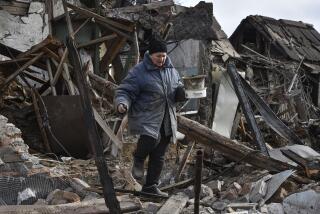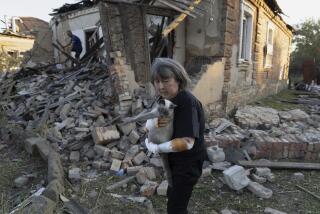Ukraine crisis may solve NATO’s ‘identity crisis’
World leaders, diplomats and experts have often fretted about the future of NATO and whether the end of its mission in Afghanistan would also be the end of its relevance.
But as 60 leaders, including President Obama, converge on Cardiff, Wales, this week for a NATO summit, the uncertainty seems more than a little premature. The politicians and diplomats have no shortage of world crises crowding their agenda, so many that the drawdown of troops from Afghanistan, once a top priority, has slipped down the list of most pressing.
Instead, the 28-nation alliance is being called upon to counter Russia’s renewed incursion in Ukraine, a jolting reminder that threats to sovereignty in Europe are not necessarily a thing of the past. While the leaders will be looking for new ways to punish Russia, they’ll also be repositioning troops, pledging more money for military spending and recommitting to collective defense.
“In some ways, NATO should thank Vladimir Putin. It was really searching for its purpose … and it was having a fairly significant identity crisis,” said Heather Conley, director of the Europe program at the Center for Strategic and International Studies, a Washington think tank. “And it has now not only been repurposed, it’s been reinvigorated.”
Obama has also added another task to the agenda. The president says he will try to corral leaders to work toward a strategy to defeat the rapidly rising Islamic State militants in Iraq and Syria.
The president faces considerable challenges in rallying his war-weary allies to sign on to a military response, particularly one that crosses the border from Iraq into Syria, officials acknowledge. But the president, who inartfully declared “we have no strategy” for defeating the extremists, is under pressure to show he is leading the world toward finding one.
Western officials have set modest expectations for breakthroughs on either Ukraine or Islamic State discussions at the summit.
The chief punishment in the pipeline for what Ukraine labeled a Russian invasion is additional economic sanctions. European Union officials took up the issue over the weekend, but put off a decision on any new penalties.
And U.S. officials noted that Obama’s key targets for cooperation on Islamic State were not necessarily NATO members.
The lineup of concerns could not have been anticipated two years ago, when the last North Atlantic Treaty Organization summit was held in Chicago and dominated by talk of the Afghanistan drawdown.
A year before that, then-Pentagon chief Robert M. Gates used his last speech in office to describe the organization as on the verge of “collective military irrelevance.”
U.S. officials persistently complained of other nations falling short of their funding targets. NATO members agree to spend 2% of their gross domestic product on defense, but only four countries — Estonia, Greece, Britain and the United States — met that benchmark last year.
But White House officials now say they sense a shift. NATO members are expected to sign a pledge in Cardiff agreeing to increase spending in support of the collective defense agreement. The details were still under discussion late last week, but the White House noted momentum behind the effort as member nations seemed to see the threats facing them in starker terms.
In light of the Russian intrusion in Ukraine, the treaty’s “defense guarantees are more salient today, more urgent today than they’ve been at any time since the end of the Cold War,” said Charles Kupchan, senior director for Europe at the National Security Council. “We are reasonably optimistic that we will get agreement among the 28 allies.”
Obama will spend much of his trip reiterating that commitment to collective defense for the benefit of Russia’s anxious neighbors. The president will begin his three-day trip with a daylong stop in Tallinn, Estonia, where he will meet with leaders of that country as well as of Latvia and Lithuania.
Estonia has seen a rotation of U.S. NATO troops on its soil since Russia annexed Ukraine’s Crimea peninsula this year, and it’s bound to get a steady stream of NATO troops under a new Readiness Action Plan set to be announced this week.
The plan aims to shorten the time for NATO forces to respond to aggression on the frontline states, officials say. It will come with increased air policing and other visible signs of alliance protection.
The move comes with some risk for NATO, which abstained from putting permanent bases in Eastern and Central Europe, a gesture of comity toward Russia. Officials say the new plan does not technically breach that agreement, but it may only be a semantic difference, said one Western diplomat, who would not be named discussing the plans before the formal announcement.
The word likely to be used to describe the NATO presence is “persistent,” the diplomat said, rather than “permanent.”
More to Read
Start your day right
Sign up for Essential California for news, features and recommendations from the L.A. Times and beyond in your inbox six days a week.
You may occasionally receive promotional content from the Los Angeles Times.







